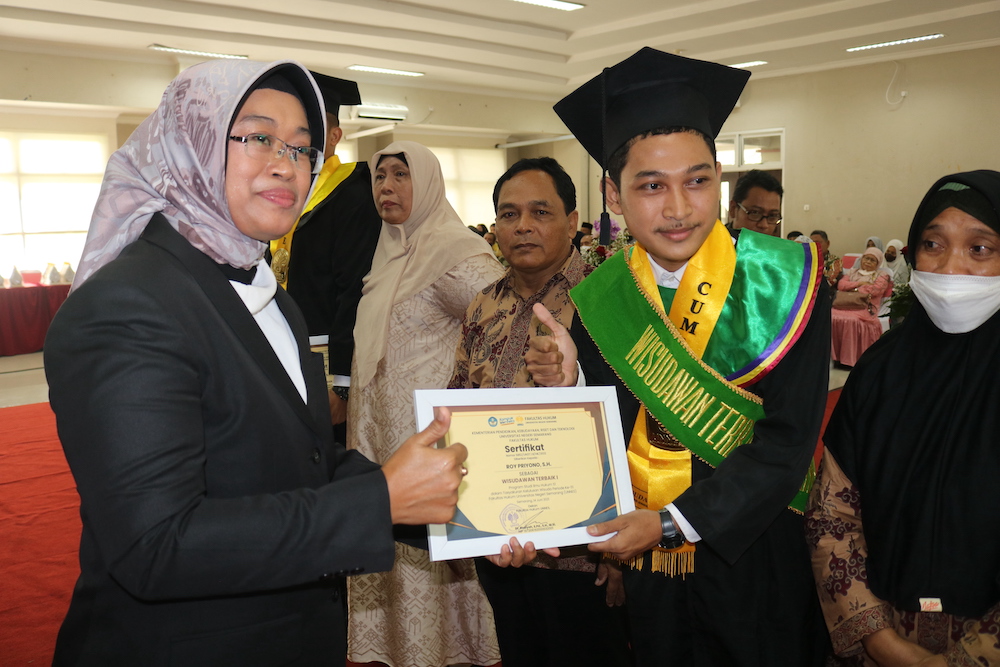Semarang State University Law Study Program was established on September 4, 2001. Permission to administer this study program was obtained on December 16, 2004 through the Directorate General of Higher Education Permit Letter, Ministry of National Education Number 4796/D/T/2004.
Even though its existence is still under the Faculty of Social Sciences, in 2005, 2006 and 2007 the Law Study Program recruited prospective new students through local university selection (SPMU) and national selection, namely the New Student Admissions Selection (SPMB) and UMB-PT). The study program implementation permit has been extended 2 times, namely (1) study program extension permit based on Director General of Higher Education Decree No.398/D/T/2007 dated March 1 2007 and (2) Study Program extension permit based on Director General of Higher Education Decree No.4129/D/ T/K-N/2010 dated 28 October 2010.
November 19, 2007, by letter Number 3840/D/T/2007, this study program received approval from the Directorate General of Higher Education, Ministry of National Education to become the Faculty of Law which was strengthened by the Decree of the Chancellor of Semarang State University Number 119/O/2007 concerning Improvement of Study Programs Law Science Becomes Law Faculty, Semarang State University, November 30 2007. S1 Study Program of Law is accredited A by BAN PT. So this proves the quality of law higher education institutions organized by Semarang State University
The Law Study Program is under the auspices of the Unnes Faculty of Law. The Law Studies Study Program was established as a consequence of the expansion of the mandate (wider mandate) of the Semarang Teachers’ Training College to become Semarang State University (Unnes). As an integral part of the university administration, the law study program refers to the statutes of Semarang State University as stated in the Regulation of the Minister of National Education Number 8 of 2011. The Law Study Program is under the management of the Faculty of Law, Semarang State University.
The UNNES Faculty of Law curriculum is a concrete form of derivative from the Vision of the UNNES Faculty of Law, to become a Faculty with a Conservation Insight and International Reputation.
The UNNES Faculty of Law curriculum is designed in such a way that it is able to equip its graduates not only in terms of scientific quality, but also mentality and character. For the Law Faculty of UNNES, apart from having intelligence, noble character and high morality are a reflection of high intellect, therefore, the curriculum at the UNNES Faculty of Law is directed so that its graduates appear in society as driving actors, change actors, and reformers.
The curriculum at the UNNES Faculty of Law was compiled and developed jointly between study program managers, lecturers, alumni and stakeholders. The curriculum is structured not only to give identity to the study program but also to pay attention to the quality of graduates. For this reason, curriculum development is carried out in a way that accommodates and adapts to the demands of the times and technology and the needs of the wider community and the job market.
Curriculum preparation was carried out for study programs in 2015. The 2015 curriculum was prepared by referring to the IQF which is in accordance with the National Higher Education Standards with Conservation characteristics. In 2019 there was a revision of the 2015 Curriculum, the revision was carried out regarding the distribution of courses per semester while still referring to the IQF according to the Higher Education Standards.
In 2020, the Ministry of Education and Culture of the Republic of Indonesia published the Merdeka Learning – Merdeka Campus policy. There are 4 main policy points, one of which is the student’s right to study for 3 (three) semesters outside of the study program. Following up on ministry policies, Semarang State University and the Faculty of Law developed the 2020 UNNES Curriculum: Independent Learning – Independent Campus. The purpose of developing this curriculum is to produce an accountable curriculum that refers to the Indonesian National Qualifications Framework (KKNI) and the National Higher Education Standards (SNPT).

General Skills Graduates of the Undergraduate Program must have the following general skills:
Special skill
Mastering practical concepts in the field of law in accordance with the special legal expertise of his choice in depth, and being able to formulate procedural problem solving in every legal event that occurs in society with an orientation towards the benefit of the people. The special legal expertise in question consists of practical skills from criminal law, civil law and constitutional law as well as state administration which have their own concept of methods and solutions, which do not only focus on juridical absolutism, but can also be intertwined with sociological studies. in handling various legal events in each of these fields. so that it is hoped that the output or results that are raised through these settlement skills can fulfill the elements of fairness, certainty, and expediency.
“..I am very fortunate to be an alumni of the UNNES Faculty of Law because back when I was a student there were many discussion forums that could create generations of Indonesian law reformers, legal reconstructors for justice and always at the pinnacle of science…” – Dr. Awaludin Marwan – (Akademisi, Lulusan S3 Utrech)
“.,One of the progressive among other law faculties in Indonesia..“ – Herry Abduh Sasmito – (Hakim Pratama Madya PTUN Pangkal Pinang).
“… No need to ask again about my pride as an alumni of FH UNNES. As a student who has been part of the tripe foundation for the establishment of the UNNES Faculty of Law, the spirit and passion as well as quality and humble lecturers have turned out to be very influential in my career and quality of life now.” –ARWANTO,SH,. (Department Head, Industrial Relation & General Affair PT. Mayora Indah,Tbk)